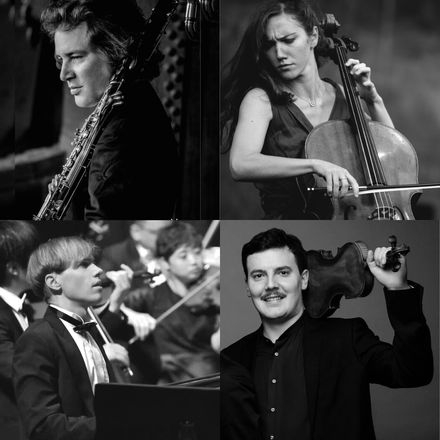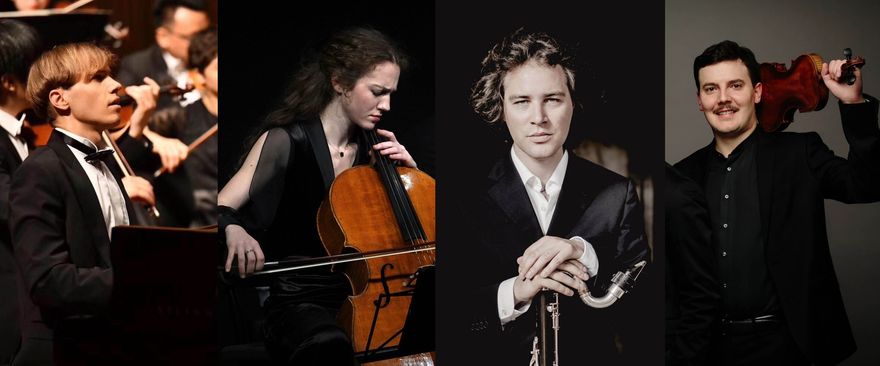BORDERLESS QUARTET (Slovenia, Italy)

Thursday
1. avgust
at 20.30
VELIKA DVORANA MESTNE OBČINE NOVA GORICA
Aljaž Beguš, clarinet
Stefano Mesaglio, violin
Erica Piccotti, cello
Nejc Kamplet, piano
Spored:
Olivier Messiaen (1908—1992), Quatuor pour la fin du Temps
Olivier Messiaen composed the Quartet for the End of Time (Quatuor pour la fin du Temps) during World War II (1940-41) as a prisoner in the German camp in Görlitz (now part of the city of Zgorzelec in Poland, which, like Nova Gorica and Gorizia, forms an urban entity with the German Görlitz). The artistic director of Festival Prečkanja – Sconfinamenti, Alexander Gadjiev, chose this piece and opted to hold the concert in Gorizia precisely because of this historical resonance and the specific circumstances under which the work was created. Additionally, the Slovenian-Italian ensemble was formed with the aim of bridging worlds on both sides of the national border. Through their highly successful international careers, these top-tier musicians of this ensemble have long transcended national boundaries and grew to become true citizens of the world of music.
The Quartet for the End of Time is a significant milestone of 20th-century chamber music in part because it was written for an unconventional ensemble (clarinet, violin, cello, and piano), a choice dictated by necessity, as Messiaen could only choose from the available prisoners in the camp. Besides its unusual instrumentation, the piece is marked by a distinctive aesthetic. An unsigned author in the French magazine L’Information musicale on July 11, 1941, described it thus: “[…] with the help of an original and organized melodic and rhythmic language, born from meditations on ancient Greek rhythms and Hindu modalism, meditations that the composer is internally compelled to create, Olivier Messiaen has led us once again, this time even deeper, into the enchanted primeval forest within himself, delighting us there with pure music. The quartet combines shimmering harmonies, the weight of slow, solemn, and hieratic lines, a playful yet noble dance of rhythmic interplay, and completely fresh inventiveness.”
The quartet is also notable in that not all movements are performed by the full ensemble. The third movement is written entirely for solo clarinet, the fourth for a trio of clarinet, violin, and cello, the fifth for cello and piano, and the eighth for violin and piano. It soon became one of the most performed chamber works in the salons of occupied Paris. The fifth movement was included in the program of the La jeune France (Young France) movement, which aimed to revitalize French culture during the German occupation in Vichy France, with Messiaen as a leading member. L’Information musicale condemned the performance of the fifth movement, a duo for cello and piano, as a violent tearing asunder of an indivisible whole.
Interestingly, in later interviews, Messiaen revealed that the work actually developed as a series of shorter sparks: “In the camp, I was with a violinist, a clarinetist, and a cellist. I immediately wrote a short trio for them. They played it for me in the bathroom […] these first sounds encouraged me to keep this short piece as a sort of prelude, around which I gradually built the other seven movements.” This added a layer of ambiguity to the order in which the movements should be performed. The renowned Parisian conductor and composer Pierre Boulez described the work as heralding a new wave of avant-garde movement. In contemporary interpretation, as Messiaen himself wrote, the work “never ends – just as it never really began: it revolves around itself, its temporal elements interweaving like the living, invisible colors of cathedral rosettes.”
In this sense, Quatuor pour la fin du Temps is groundbreaking not only for its historical significance and specific instrumentation but also as a harbinger of a new narrative structure, replacing the linearity of musical storytelling with cyclicality. (text by J. J.)
Borderless Quartet is a modular ensemble, which consistently features two Italian and two Slovenian master musicians and performs music which transcends the differences between these two nations.
Slovenian virtuoso Aljaž Beguš boasts an impressive array of accolades, including five first prizes from the national TEMSIG competitions and victories in numerous international contests such as Citta’ di Carlino and Marco Fiorindo. In 2005, he was honored with the student Prešeren Award, and two years later, he reached the semifinals of the international Eurovision competition EBU New Talent in Bratislava. In 2014, he and his woodwind quintet, Spirito, advanced to the semifinals of the ARD competition. Beguš is not only a distinguished soloist but also a sought-after collaborator with elite chamber ensembles and orchestras. His orchestral collaborations include Spira Mirabilis, Orchestra da Camera di Mantova, Orchestra Mozart (Bologna), English National Opera, European Union Youth Orchestra, and Gustav Mahler Jugendorchester. As a soloist, he has shared stages with the Slovenian Philharmonic Orchestra, RTV Slovenia Symphony Orchestra, Gustav Mahler Jugendorchester, Jena Philharmonic, Orchestra da Camera di Mantova, Academy of Music Wind Orchestra, RTV Big Band and others. he has been invited to perform at renowned festivals such as BBC Proms, Luzern Festival, Young Euro Classics, Bolzano Festival, Mantova Chamber Music Festival, Salzburger Festspiele, and Kammermusikfest Lockenhaus. Currently, Aljaž Beguš holds the position of bass clarinetist with the Slovenian Philharmonic Orchestra.
Inspired by great virtuosos of violin, Udine’s native Stefano Mesaglio first started learning the devil’s instrument at the age of 6. Having studied in Austria with professor Helfried Fister, he graduated with distinctions in both artistry and pedagogy. During this period, he co-founded the Furiant Quartet, where he plays first violin. Under the tutelage of professor Eberhard Feltz and professor Tim Vogler, Stefano earned his master’s degree in chamber music performance from The Hochschule für Musik Hanns Eisler in Berlin with a scholarship from the Yehudi Menuhin Live Music Now (Berlin). He is currently working towards his second master’s degree, this time in violin performance, with professor Mark Gothoni at The Universität der Künste Berlin. Stefano has performed as soloist and with various orchestras in Europe and Asia, often sitting as concertmaster and/or principal second violin. Though he favours smaller chamber ensembles, he continues to perform with chamber orchestras and full orchestras in Europe and abroad.
Italian cellist Erica Piccotti graduated at 14 years of age with honours from the Santa Cecilia Conservatory of Music in Rome. She continued her studies with Antonio Meneses at Höchschule der Künste in Bern, at Walter Stauffer Academy in Cremona, and at Accademia Chigiana in Siena. In 2013 she was awarded the Certificate of Honor Alfiere della Repubblica for outstanding achievements in music by the President of the Italian Republic Giorgio Napolitano. The highlights of her 2021/2022 season include solo performances with conductors Sir Antonio Pappano and Daniel Oren, and closing out the season at IUC with Orchestra Canova under Maestro Enrico Pagano. She won national and international competitions, earned the title of Best Cellist of the Italian Conservatories, Premio Città di Padova, Jugend Musiziert Nuremberg, and the title of laureate at the NYIAA Competition; this victory allowed her to perform at Carnegie Hall in New York and won her the Maura Giorgetti scholarship of Filarmonica della Scala in Milan. This is only one small segment of a long list of her competitive successes. As a soloist, she was accompanied by Zagreb Soloists, La Verdi in Milan, I Pomeriggi Musicali Orchestra, Kodaly Philarmonic Orchestra Debrecen, Orquestra Sinfonica del Estado del Mèxico, to name but a few. She is currently pursuing her Professional Studies degree with Frans Helmerson at the Kronberg Academy for Young soloists.
Pianist Nejc Kamplet studied at the University of Music and Performing Arts Graz in the class of Professor Zuzana Niederdorfer before moving on to the Hanover University of Music, Drama and Media in Hannover all the while honing his skills with numerous world-renowned pianists like Jacques Rouvier, Arie Vardi, Daejin Kim, Mikhail Voskresensky, Aleksandar Madžar, and Sofya Gulyak. He achieved enviable results at notable international competitions. His recent prominent victories include Yamaha’s 2020 Scholarship competition in Vienna and the Franz Liszt Online Competition of 2021. From a very young age he has also actively participated in renowned music festivals including Festival Ljubljana, Festival Lent, Festival Maribor, Carpe Artem, The Night of Slovenian Composers, and Arsonore. As a soloist he performed in Slovenia, Croatia, Slovakia, Austria, Italy, Germany, Lithuania, Estonia, China and the USA. His recordings for the Slovenian National Television are aired regularly. His exceptional achievements have brought him the scholarship of the Slovenian Ministry of Culture and the Scholarship of the Municipality of Graz in Austria.
The Festival Prečkanja–Sconfinamenti project is funded by the European Union from the Small Projects Fund GO! 2025 financed by the Interreg VI-A-Italy-Slovenian 2021–2027 programme, managed by EGTC GO.

